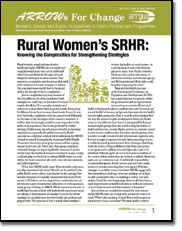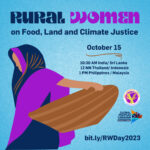Rural Women’s SRHR: Knowing the Complexities for Strengthening Strategies
 Rural women’s sexual and reproductive health and rights (SRHR) are not simple and straightforward issues that can be addressed effectively and efficiently through universal blueprints developed in urban centers. They represent a complexity and dynamism that need to be understood because strategies to address the concerned issues would have to be placed within the domain of these complexities.
Rural women’s sexual and reproductive health and rights (SRHR) are not simple and straightforward issues that can be addressed effectively and efficiently through universal blueprints developed in urban centers. They represent a complexity and dynamism that need to be understood because strategies to address the concerned issues would have to be placed within the domain of these complexities.
Just as complexities may vary, because of the very difference in what constitutes ‘rural,’ strategies too could vary on the basis of women’s empirical realities. (For example, strategies and outcomes in areas where there is greater female literacy may be different from those in areas where female literacy is very low.) Similarly, complexity could also present itself differently on the basis of the ideologies of the country concerned. A welfare state, for example, would be more responsive to the needs of its population than a state governed by market ideology. Furthermore, the robustness of health professional organisations, especially the public/community health associations, could play a critical role in addressing the SRHR of rural women. For example, the American Public Health Association has a very active peace caucus and has a group named health-not-war. These and other groups champion structural changes for improving health outcomes. Last but not the least, the health of women’s movements in any country could also play a critical role in raising SRHR issues not only within the heath sector, but also with other relevant ministries and political parties.
What does SRHR really mean? Does sexuality only mean sexually transmitted infections? Should one be satisfied if the public health sector offers a reproductive health package that includes treatment for sexually transmitted infections? If the answer is NO, then one has stepped into a realm that has not yet become a part of mainstream education or of discussions in many groups working on SRHR. While social determinants of health have become a fairly well understood concern, not many are talking of determinants of sexuality. Coercive sex within marriage is a sexuality issue that few health care professionals grapple with. The question of who controls their sexuality— women themselves or social norms—is a priority issue of only a few feminist groups in many Asia-Pacific countries. However, who explores the nature of interaction between such feminist groups and RH practitioners? Both sides could be guilty of ignoring the other!
click here to download full document (PDF)
Published by the Asian-Pacific Resource & Research Centre for Women (ARROW)







